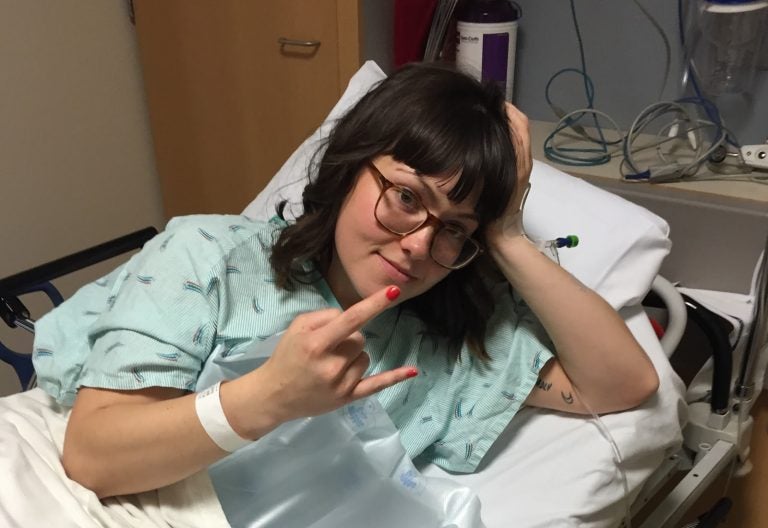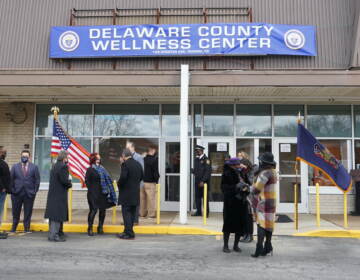Tie my tubes: choosing permanent contraception
Listen
Brie Ripley the day of a bilateral salpingectomy procedure that removed both of her fallopian tubes. (Courtesy of Posey Gruener)
Brie Ripley was young, female and seeking surgery to remain childfree.
My mom was the first person to tell me, ‘you don’t have to have babies.’
That made sense to me.
“You know how people imagine getting married, and having weddings? Well I didn’t dream of any of that,” said my Mom. “In fact I didn’t think I was going to have kids.”
“What changed your mind?” I asked her.
“Getting pregnant,” she said. “With you.”
For my entire childhood, my mom was addicted to pain meds and later was diagnosed with bipolar disorder, the kind where she was in and out of the hospital for suicide attempts.
Watching my mom struggle made me feel helpless — like I was dealing with the side effects of her illness. Coaches often had to drive me home after basketball practice because my mom would either forget, or be too high to drive. My mom would get into fights with my friends’ moms, which is probably why my invitations for sleepovers and birthday parties always ‘got lost in the mail.’ When my mom forgot to pack my lunch, kind cafeteria workers at school let me have free lunch so I could eat those little square pizza slices.
If I was to have children, I know that it’s only slightly likely that I would pass along my mom’s health issues to them, but I decided that I didn’t want to take any chance on that.
I get that plenty of people with mental health issues have happy, healthy, full-lives. But this decision isn’t about other people, this is about me and what I want for myself, and for my future. I decided to nip my branch of the family tree in the bud.
When I was seventeen, I started asking doctors to sterilize me. But they wouldn’t. They told me things like, ‘Well, what if you change your mind later?’ or, ‘You’re too young to know this is the right choice for you.’
I put a call out to speak with women who wanted to get their tubes tied, spoke with about two dozen. Lots of them heard similar things from their doctors.
One woman was told she and her partner had to do marriage counseling for a year. Another woman says she heard: ‘No way, no how — you have to have kids first.’ Several people were told this: “What if you change your mind and what if you meet a nice guy?’
Twenty-seven-year-old Takeallah Rivera says she’s wanted to have her tubes tied since she was 16, but doctors said ‘no’ to sterilization, even after she turned 18, the legal age of consent. Instead, doctors offered her less permanent forms of birth control, like the NuvaRing. But after a year of using it, she wasn’t feeling right.
She wondered, ‘Dang! Could I be pregnant?’
“… I went to a doctor and they did a pregnancy test and they were like, ‘No you’re not pregnant; you are using the NuvaRing correctly, we don’t know what’s wrong,'” Rivera said. “So I go back to the doctor a couple of weeks later and they’re like, ‘Oh, you actually are pregnant. We’re sorry.’ And I’m thinking, ‘Oh.'”
That ‘Oh’ moment — that’s a moment of realization I’m trying to avoid.
I’ve tried the pill, the patch, the Nexplanon arm implant, and the Depo-Provera shot. For me, all of these birth control options came with a litany of hormonal side effects, which felt like my emotions were out of control. And even more uncomfortably, those feelings reminded me of my mom’s struggle with her mood disorder.
Finally, I tried an IUD, intrauterine device. But after a year, my body expelled it after a particularly painful period.
None of these temporary birth control options worked for me.
I know you guys might be thinking, this is all about me being young, but it’s not. It’s about doctors not trusting me with my female-body. I spoke with women who were even in their 40s and 50s who also got a lot of pushback when they were trying to make the same decision.
Angela Ginorio is a gender studies professor at the University of Washington. When she gave birth to her son in 1989, when she was 41. She wanted to have her tubes tied at that moment, but doctors refused to do it.
That was understandable: it was the hospital’s policy not to perform sterilization immediately after childbirth — but, Ginorio had to wait three years.
“They told me that if I still wanted to tie my tubes in two or three years, they would do it,” Ginorio said.
When my guy friend Luke Beetham decided he wanted to get a vasectomy, it was a lot easier. He was 29, single, didn’t have any children — and he didn’t want any. So he found a clinic in Seattle that advertises on TV. The physician goes by ‘Dr. Snip.’
“I did a pre-visit, an interview to find out if I was a candidate,” Beetham said. “And I think given like a cool-off period of like a week, or a couple weeks.”
Two weeks! I tried for over five years to get sterilized. There’s not anything like a walk-in vasectomy clinic available for women.
But, thanks to an online message board called a sub-Reddit that offers resources for women pursuing a childfree lifestyle, I found an obstetrician-gynecologist named Sue Moreni. Someone posted Moreni’s contact information. Presto! Thanks internet.
After a short doctor’s visit, where I assured her this was something I really wanted for myself, we scheduled my surgery.
My insurance covered the $1,800 procedure because it’s technically birth control.
The tubal ligation option I chose removed my fallopian tubes entirely.
Today, I’m 24 and I feel closer to my ideal self. It’s been just over a year since the procedure, and intimacy is great now that I don’t have to think about unplanned pregnancy.
But, I look forward to all the other surprises that life’s going to bring me.
Editor’s note: Journalist Brie Ripley is working on a radio documentary series called Tie My Tubes.
WHYY is your source for fact-based, in-depth journalism and information. As a nonprofit organization, we rely on financial support from readers like you. Please give today.






